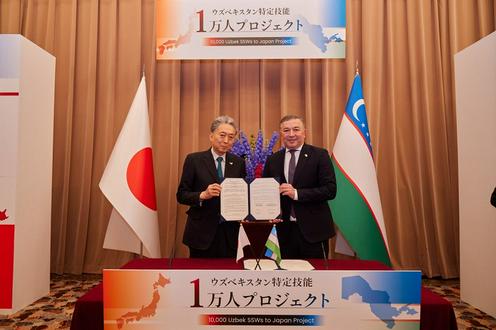Uzbekistan’s Migration Agency and the Japan-China-Asia Medical Educational Cultural Exchange General Incorporated Foundation (JCAEMCE) have signed an agreement to employ 10,000 Uzbek citizens at Japanese enterprises over the next five years, according to a statement from the Uzbek agency.
To qualify for employment in Japan, Uzbek labor migrants will be required to complete courses in Japanese language and cultural etiquette, followed by an examination. The “Yapon Mahorat Nuri” training centers will open in Tashkent, as well as in the Samarkand and Namangan regions.
In addition, a new online platform called WiseBridge—set to launch in June—will allow job seekers to independently search for vacancies in Japan and communicate directly with potential employers.
During the Uzbek delegation’s visit to Japan, officials also discussed simplifying the visa process, digitalizing migration procedures, and reducing the time required to obtain entry permits. Agreements were reached on legal protections for Uzbek citizens working in Japan and on efforts to prevent illegal migration.
“The technical internship program currently operating in Japan, along with a simplified visa system for highly skilled professionals, opens new opportunities for Uzbek nationals to work legally and safely in Japan, gain experience in a highly cultured work environment, and realize their potential,” said Japan’s Minister of Justice, Keisuke Suzuki.
Discussions about enabling legal employment for Uzbeks in Japan date back to 2017, when proposals included the potential recruitment of up to 1,000 nurses from Uzbekistan.
In early 2019, Japan’s then-Minister of Health, Labour and Welfare, Takumi Nemoto, visited Tashkent and announced that Japan would consider including Uzbekistan on its list of labor-exporting countries, thanks to new migration laws passed the previous year.










